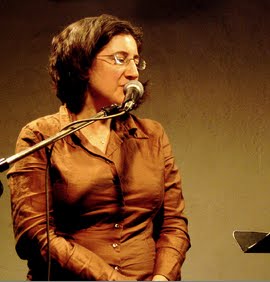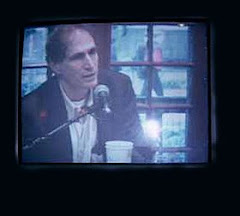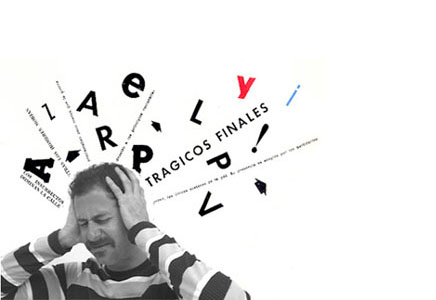 LISTEN TO THE SHOW
LISTEN TO THE SHOWWe know one poet who can bring Kim Jong-il, Montezuma and Maggie Thatcher--and us--together to the table. It's Rodrigo Toscano, and more specifically the Rodrigo Toscano who wrote the poems collected in the book Platform. The word "platform," Al notes in this newest PoemTalk episode, suggests something programmatic, something being contended overall. And one plank, as it were, of this platform is--for Toscano--the relatively light (comic, playful, quick) poem "Poetics," suggesting an aesthetic program, maybe even an ars poetica. Taking this titular cue, the PoemTalkers this time, Randall Couch, Linh Dinh, and Emily Abendroth, sought to piece together the ranging geo-political references, heard the many different registers, tried to place them in a musical idiom, and either concluded that the "Psycho-Acoustic[...] / Jangling" makes a beautiful sound and has a special political force or that the jangling, while beautiful, puts the platform's meaning just out of reach. Al, Emily, and Randall take the former view of the poem, while Linh, in a dissenting mood, takes the latter.
That musical idiom is jazz. The political import of "Pyongyang"--the jarring disharmonious pesty capital of North Korea, an uncooperative element in any poem--leads us in one direction. But its sheer sound sounds more like jazz than communism.
But it does...
as an In Walk Bud
flips the whooole session
on its head
lexicals
in range
clash
and dash out
"In Walked Bud" is a Thelonious Monk piece (made into a soundy poem by jazz-minded Amiri Baraka). The session is what we call a gathering of jazz musicians somewhat improvisationally making their special noise, always a greater aural whole than the parts alone. The poem is a geopolitical session. The lexicals brought within range "clash," yes, but they also "dash out": appearing off the scale, as Pyongyang does in almost any so-called postcommunist discussion, and yet crazy musical 14ths can be worked just right to produce "perfect fifths / effects."
If you like this poem, it's because Toscano helps you imagine that the improvised postcommunist joint can start hoppin' and that a poem is just about the only place, for now, where such a "real summit meeting" (jazzworld phrase for bringing together just the right [blues] elements) can take place.
 Really? Does Rodrigo Toscano really want Margaret Thatcher to join in--"as guest / jew-harp / soloist?" Sounds like a good deal of mockery there. But if she does join this performance of a Postmodernity Rag, notwithstanding the "formative / contradictions" of the European Union remaining "unresolved," we are left in the end with a reminder that we are all implicated. Postmodern political life makes a "ho'" of itself, just as Maggie does, just as we do. Emily Abendroth comments on this: can we like or accept one aspect of postmodern life but keep clear of and unimplicated in the rest?
Really? Does Rodrigo Toscano really want Margaret Thatcher to join in--"as guest / jew-harp / soloist?" Sounds like a good deal of mockery there. But if she does join this performance of a Postmodernity Rag, notwithstanding the "formative / contradictions" of the European Union remaining "unresolved," we are left in the end with a reminder that we are all implicated. Postmodern political life makes a "ho'" of itself, just as Maggie does, just as we do. Emily Abendroth comments on this: can we like or accept one aspect of postmodern life but keep clear of and unimplicated in the rest? You got the microphone now, so...let's hear it. From the platform, your oration might begin: "A specter is haunting poetic discourse...."
- - -
Here's our PennSound recording of the poem, made in Buffalo in November of 2001.


























7 comments:
"poetics" combines the life outside and inside of everyone's kitchen, living room, bedroom or favorite side to be on, even invisibly so, jazz music and the spit you swap, an unread book or a book unwritten, takes you where you need to go, or not, like language itself, situational and do what you must, to thy own self, enough already...this side of the Delaware river, this desolate rooftop resonating rain drizzle...
I love this show and, as always, I enjoyed the discussion. But it seemed like there was an elephant in the room--Toscano is a Chicano--it was if no one wanted to incorporate that into the talk. Or am I only saying this because I listened to the discussion through my Mexican-American ears?
Fred, I think you're right about that omission. I remember not knowing how to find the mark of its relevance. Where would you find it or remark on it? - Al
Hi Al,
I just had this exchange with Eiríkur Örn Norðdahl:
Hey Linh.
Heard you on poemtalk. It was good. You hit home on several points--especially the political bits and the jangly bits, the song of the poem. I missed someone bringing up the "old" european avant-garde, and the political motives behind this ripped apart language--and a discussion on the political motives behind using charged political words (which is of course something I do alot, in the dictator-sound-poems etc.--and I recognized a similar thing at play in Rodrigo, although perhaps that's just my vainglory).
As with the blogging about poetry vs. blogging about politics, I've mostly fallen on the other side of that pit--Icelandic blogs are so much about politics, so much information and misinformation, rants and nonsense, that I ended up distancing myself from it more than is good for me. I'll probably get back on the horse though. When I feel something can be said that doesn't just fall through the cracks and get forgotten about.
Anyways--just thought I'd write and say cheers for the program.
all the best,
Eiríkur
Yo Eiríkur,
Your dictator poems are different than this Toscano. By riffing on an iconic mass murderer's name, you emphasize its sonic qualities while ignoring the evil connotations. It's a comically nihilistic gesture. Toscano, on the other hand, seems to be making a polemic by mentioning Pyongyang, Thatcher and the European Union, but his syllogistic sequence leads nowhere. In that sense, and in this poem at least, he is more nihilistic than you!
Linh
a jam is a jam, even with folks who can't jam, but keep failing to jam, locality and psyche not in rhythm, but for soemone who makes the imperfect perfect and imperfect again -- in walked anyone who wasn't there before --the poetics as such, an ubiquitous human dilemma of who we are on a 'platform' without foundation (perhaps), without politics meaning more than everything you waht you improvise or fake...
Al, thanks for responding. Just a thought, just a listen: the pinging sonics that are redolent of culture clash—Mexican mestizaje and pomo have some things in common. With Chicanos, there are even more ingredients tossed into the mix. There’s the intriguing “Quetzalcoatl…feathers falling…field’s been recharged”
stretch. And then there’s the familiar goofy humor.
Quite a remarkable poem-- sticks in the brain like a burr-- and this program really opened it up for me in a very powerful and compelling way. (Though interestingly I had points of disagreement with each of the individual respondents.)
Also interestingly, while this poem claims to have been infected with the sound of "Pyongyang", it also performs the reverse function: I cannot now read Pyongyang in the newspaper without hearing this poem.
Regarding (what I have heard is) Toscano's working class, Chicano, autodidact background: it's true we shouldn't ignore it, but we should also guard against a glib/reductive assuming or attributing of "what comes from where". My sense is that Toscano's background/life trajectory probably influences this poem, and all his work, in profound but oblique ways, by shaping his quirky, unique and sometimes estranging relationship to language. (Bi/multi-lingualism itself is part of the estrangement that enters here.) In other words, it is his *perspective* and not his identity that has a bearing on this poem...? Some would say that's the same thing, but...
Post a Comment